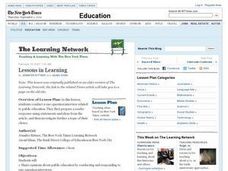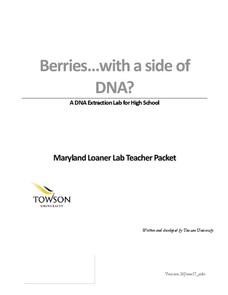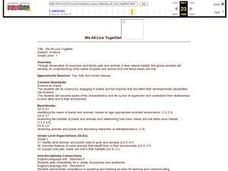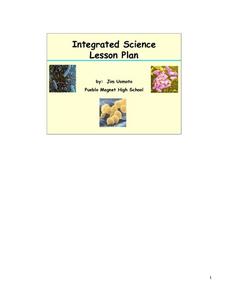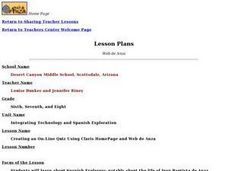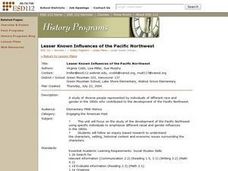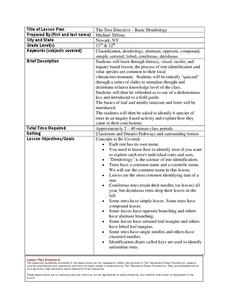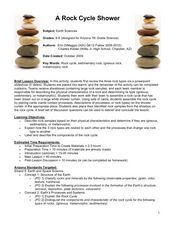Curated OER
The Man Who Mistook His Wife for a Hat
Four scenarios of unusual human behaviors are given to your psychology class. Based on their knowledge of brain anatomy and function, they consider what parts of the brain might be affected in order to result in the behaviors. This case...
Curated OER
Galileo's Thermometer: Measuring the Density of Various Unknown Liquids
Sprouting scientists explore the concept of density by making mass and volume measurements for five different liquids. From these measurements, they calculate densities. They apply their learning to explain Galileo's thermometer works...
Curated OER
Measuring Precipitation
A little engineering design is mixed into this lesson on precipitation measurement. Groups plan and construct a rain gauge, and use it to collect precipitation. As part of the PowerPoint presentation, learners view a satellite map of...
Edgate
Why Map a Map?
After brainstorming reasons why Native Americans mapped their lands, your young critical thinkers will work together to review their ideas and determine the definition of a map. With today's extensive use of mapping technology and GPS...
Southern Nevada Health District
Is It Fruit?
The concept is the most valuable feature of this resource, which is designed to bring learners' attention to the nutritional labels of food items. Your class will take a closer look at the labels on bottled juice containers to determine...
Curated OER
Lessons in Learning
Students share their opinions about public education by responding to one-question interviews. After reading an article, they discover new recommendations for the No Child Left Behind Act. They prepare a three-part reader response to...
Curated OER
The Primary Issue
Students analyze the 2008 presidential primaries by reading and discussing the New York Times Upfront article "Primary Matters." They complete a KWL chart, complete a handout, read the article and answer comprehension questions, and...
Crabtree Publishing
Why Does Media Literacy Matter?
Criticism of news and entertainment journalism is at an all-time high. Help 21st-century learners develop the media literacy skills they need to become critical consumers with a three-lesson guide the looks at persuasive techniques used...
Towson University
Berries...With a Side of DNA? (High School)
Is DNA still present after picking fruit or cooking vegetables? Biology scholars extract and collect DNA strands in an impactful lab. Working groups prepare their samples and compare their results to negative and positive standard...
National History Day
“War Is Hell. We Know it Now.” American Soldiers in the Meuse-Argonne Offensive
Understanding the soldier's experiences during World War I sometimes takes a newscast. Learners see the importance of understanding multiple points of view with a newscast project surrounding the Meuse-Argonne Offensive. Compare and...
Curated OER
We All Live Together
First graders examine the lifestyle of classroom and family pets in their natural habitat. They determine the needs of plants and animals, and how those needs are met. They listen to read alouds, sing songs, and draw using computer based...
Tracy Pendry
Cardiovascular/Circulatory System
Explore the circulatory system with a cardiovascular pump activity that promotes discovery and discussion as class members create a functioning model of the heart. Continue the learning process through a web quest showcasing the body's...
Curated OER
Scientific Method Unit: Bacteria
Young scholars discover how to apply the steps of the inquiry process through the study of bacteria. Working in groups of four, they cooperatively read an article about bacteria and complete a graphic organizer. Group members share with...
Curated OER
Travel Agency
Students create a travel agency from favorite vacation destinations. The skill of reading and using a database is covered. Profiles of travelers are used to teach sorting into different categories during inquiry.
Curated OER
Technology and Spanish Exploration
Students examine the life of explorer, Juan Bautista de Anza. They create an on-line quiz based on their findings.
Curated OER
Animal Coverings
Students compare and contrast the types of coverings found on animals. They identify a wide variety of animals in a museum room. They classify animals based on their coverings as well.
Curated OER
How Does Who I Am Relate to Employability?
Sixth graders participate in question and answer sessions and develop a skill-based resume. They identify and explain resume-writing situations in which an ethical dilemma may present itself. Finally, 6th graders identify and project the...
Curated OER
Tee Off!
Students explore about one of the many products created by gain-based process. They investigate the ways agriculture can protect and preserve the environment. Pupils use their scientific processing skills to conduct a full inquiry based...
Curated OER
Lesser Known Influences of the Pacific Northwest
High schoolers engage in research about the development of the Pacific Northwest using specific individuals to emphasize different racial and gender influences in the 1800's. The research method that is used is inquiry based.
Curated OER
Pulling It All Together
Students review data about a health problem and prepare an investigative report. Teams trade reports and utilize skills developed from previous lessons to evaluate the critical thinking evident in the reports.
Curated OER
Alice Computer Programming
Students explore multimedia components. In this science inquiry lesson, students read "Invitation to the Game" by Monica Hughes and they use the Alice Computer Programming System to better understand population dynamics.
Curated OER
The Tree Detective - Basic Dendrology
Students identify tree species by their leaf characteristics. In this dendrology lesson plan, students learn leaf vocabulary and collect leaves. They identify the leaves using the leaf characteristics and the vocabulary that they learned.
Curated OER
A Rock Cycle Shower
Learners classify rocks as sedimentary, igneous or metamorphic based on physical properties. In this earth science lesson, students recreate the rock cycle using a set of stones placed on labeled shower curtain. They explain the...
Curated OER
Food for Thought
Fifth graders explore the brain and what is needs. In this biology lesson plan, 5th graders will work on a series of activities that will allow them to learn about the brain, its parts, and the best foods to eat for their brain.
Other popular searches
- Inquiry Based Learning Maths
- Inquiry Based Learning Plant
- Inquiry Based Learning Science
- Inquiry Based Learning Space
- Math Inquiry Based Learning







